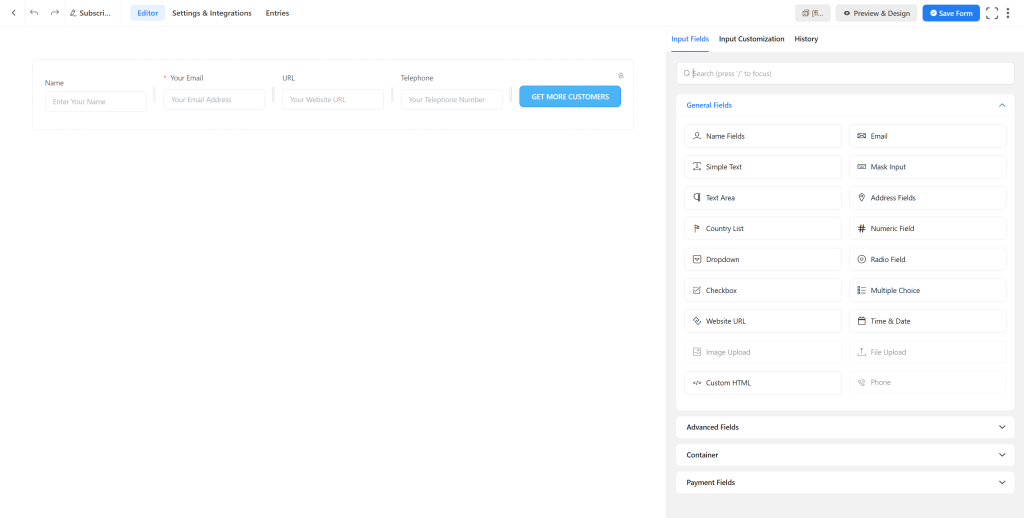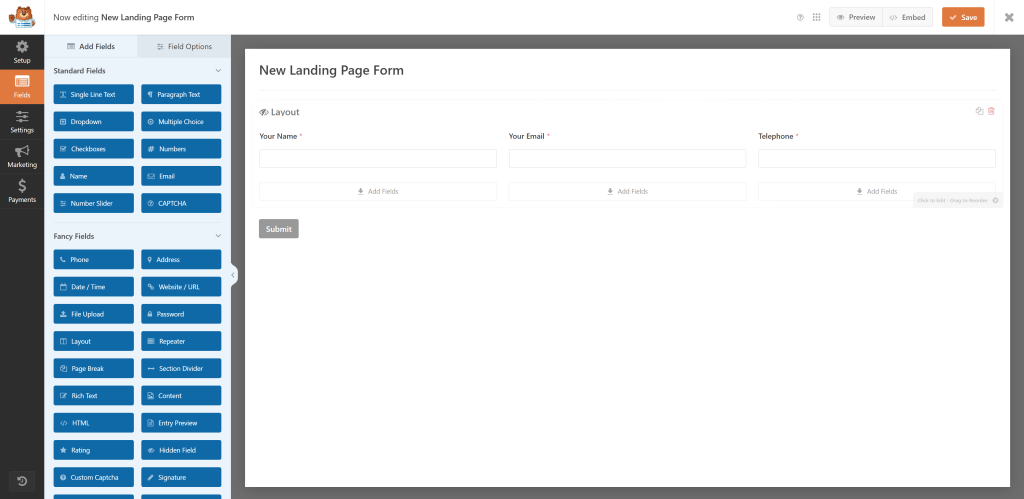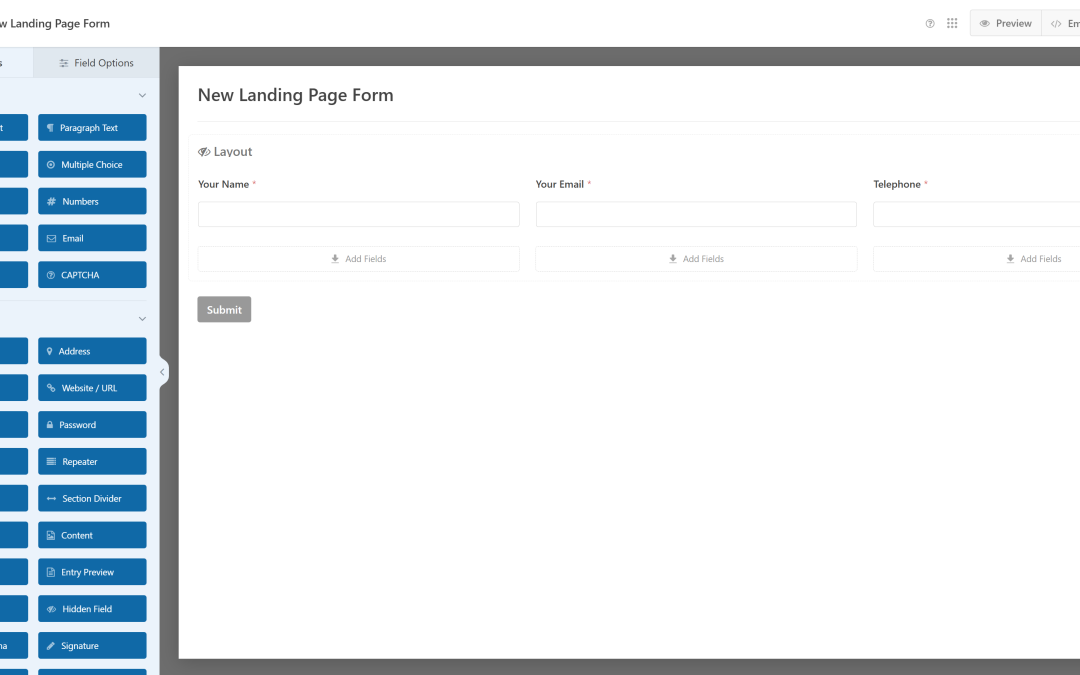Understanding the Basics of Each Plugin
Fluent Forms Overview

This is the UI interface to edit a form in Fluent Forms.
Fluent Forms is a modern, lightweight form builder designed for WordPress users who seek a powerful yet user-friendly solution. With over 600,000 active installations, it has gained a reputation for its extensive features and ease of use. The plugin offers a full-featured free version, making it accessible for users who are just starting out. The free version of Fluent Forms doesn’t allow for easy customization without the use of custom CSS.
Key Features:
- Drag-and-Drop Builder: Create forms effortlessly with a simple drag-and-drop interface.
- Conditional Logic: Customize forms based on user responses to enhance user engagement.
- Conversational Forms: Engage users with interactive, step-by-step forms.
- Multi-Column Layouts: Design visually appealing forms with flexible layouts.
WPForms Overview

The editor for a form in WP-Forms. Notice the customization options.
WPForms is one of the most widely used form builders in the WordPress ecosystem. Known for its beginner-friendly interface, it offers a range of templates and integrations. However, many users express frustration with its tiered pricing model, which can lead to additional costs for essential features. The team at Website Promoters has found that WPForms is the easiest to customize the styling of without the use of custom CSS or through the use of WordPress plugins such as CSS Hero. CSS Hero is an excellent plugin that Website Promoters recommends.
Key Features:
- User-Friendly Interface: A clean, intuitive design that simplifies form creation.
- Extensive Template Library: Access to over 2,000 pre-built templates.
- Smart Conditional Logic: Available only in higher-tier plans, allowing for dynamic form behavior.
- Payment Integrations: Supports various payment gateways, but often requires a premium plan.
Forminator Overview
Forminator is a versatile form builder developed by WPMU DEV, known for its focus on quizzes and polls. It offers a robust free version, making it an attractive option for users looking for a budget-friendly solution. Forminator is particularly popular among users who need to create interactive forms.
Key Features:
- Polls and Quizzes: Create engaging quizzes and polls to gather user feedback. This is one feature that isn’t available in WPForms and Fluent Forms.
- File Uploads: Allow users to upload files directly through the form. This is another feature that isn’t available in WPForms and Fluent Forms.
- Third-Party Integrations: Connect with various services to enhance functionality.
- Customizable Templates: Offers a selection of templates to kickstart your form creation.
Feature Comparison
User Interface and Ease of Use
Fluent Forms: The drag-and-drop interface is intuitive, allowing users to create forms quickly without any coding knowledge. The real-time preview feature helps users visualize their forms as they build them.
WPForms: While WPForms also offers a user-friendly interface, some users report that the form editor can become sluggish with larger forms. The separation of the form editor from the main dashboard can be inconvenient.
Forminator: Forminator provides a straightforward interface, but some users may find the navigation slightly less intuitive compared to Fluent Forms. However, it still offers a drag-and-drop builder that simplifies the form creation process.
Input Fields and Customization Options
Fluent Forms: Offers over 60 input fields, including advanced options like date pickers and file uploads. Users can customize field settings extensively, ensuring forms meet specific requirements.
WPForms: Provides around 40 fields, but many advanced fields are locked behind higher-tier plans. The customization options are robust, but users may feel limited by the available fields in the free version.
Forminator: Features a decent selection of input fields, including unique options like polls and quizzes. However, it may not have as many advanced fields as Fluent Forms, which could limit its versatility for some users.
Conditional Logic and Dynamic Forms
Fluent Forms: Conditional logic is available in both the free and pro versions, allowing users to create dynamic forms that adapt based on user input. This feature enhances user engagement and improves data collection.
WPForms: Conditional logic is only available in the Pro version, which can be a drawback for users on a budget. However, when available, it functions effectively to create personalized user experiences.
Forminator: Offers conditional logic features, allowing users to show or hide fields based on previous answers. This functionality is beneficial for creating tailored forms.
Templates and Pre-Built Designs
Fluent Forms: Comes with over 70 pre-built templates, making it easy for users to get started. The templates are designed for various use cases, from contact forms to surveys.
WPForms: Boasts an extensive library of over 2,000 templates, but many are only accessible in the paid versions. The templates are well-designed and cater to a wide range of needs.
Forminator: Provides a limited selection of templates compared to its competitors. Users may need to create forms from scratch more often, which could be time-consuming.
Integration Capabilities
Fluent Forms: Supports numerous integrations with popular services like Mailchimp, Zapier, and payment gateways. This flexibility allows users to connect their forms with various tools seamlessly.
WPForms: Offers a wide range of integrations, but many are only available in higher-tier plans. Users may find themselves needing to upgrade to access essential integrations.
Forminator: Features a robust set of third-party integrations, including email marketing services and CRM systems. The free version allows for a decent number of integrations, making it a strong contender.
Pricing Structure
Fluent Forms Pricing
Fluent Forms offers a freemium model, with a free version that includes many essential features. The premium plans are competitively priced:
- Single Site License: $79/year
- Agency License (5 Sites): $159/year
- Unlimited Sites License: $299/year
WPForms Pricing
WPForms follows a tiered pricing model, which can become costly for users needing advanced features:
- Basic Plan: $99/year (1 site)
- Plus Plan: $199/year (3 sites)
- Pro Plan: $399/year (5 sites)
- Elite Plan: $599/year (unlimited sites)
Forminator Pricing
Forminator is known for its affordability, offering a free version with many features. The premium plans are also reasonably priced:
- Basic Plan: $36/year
- Standard Plan: $60/year
- Freelancer Plan: $120/year
- Unlimited Plan: $240/year
Customer Support and Documentation
Fluent Forms Support
Fluent Forms provides extensive documentation, including tutorials and guides. The support team is responsive and available to assist users with any issues they encounter.
WPForms Support
WPForms offers solid documentation and a support team that is generally helpful. However, some users have reported longer response times during peak periods.
Forminator Support
Forminator provides good documentation, but the support may not be as robust as that of Fluent Forms or WPForms. Users may need to rely more on community forums for assistance.
Final Verdict: Which Form Builder is Right for You?
Choosing the right form builder ultimately depends on your specific needs and budget. Here’s a quick recap to help you decide:
- Fluent Forms is ideal for users seeking a feature-rich, user-friendly solution with a competitive pricing structure. Its extensive features and integrations make it suitable for various applications.
- WPForms is best for those who prioritize a vast template library and are willing to invest in a premium plan for advanced features. However, the tiered pricing may be a drawback for budget-conscious users.
- Forminator is an excellent choice for users looking for an affordable option with solid features, especially for quizzes and polls. Its free version is robust, making it suitable for those just starting out.
In conclusion, each of these form builders has its strengths and weaknesses. By evaluating your specific requirements and budget, you can select the one that best fits your needs. Whether you choose Fluent Forms, WPForms, or Forminator, you’ll be equipped to create effective forms that enhance your website’s functionality and user experience. Website Promoters has used all three and would recommend any of them. To see a form created using Forminator, visit our website and consider filling it out for information about our services.

0 Comments